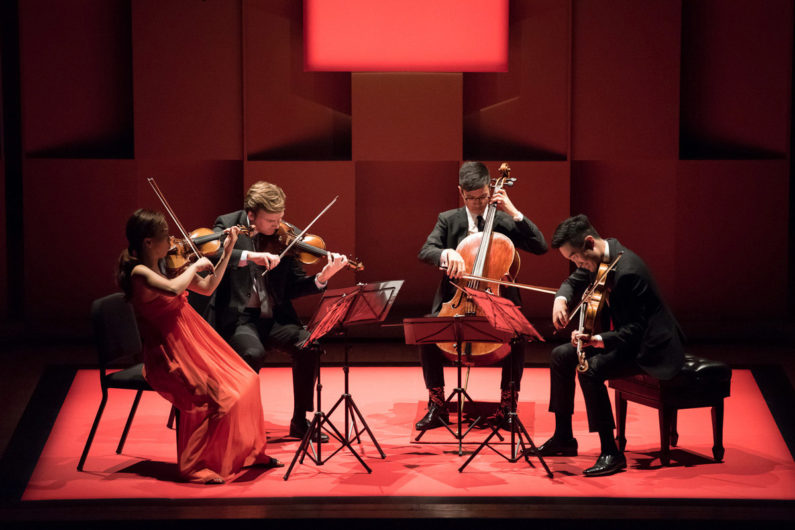Stanford hosts Rolston String Quartet, heralding a bright future for chamber music
Stanford’s Azure Family Concert series and the St. Lawrence String Quartet continue to bring the best emerging quartets to campus.

The Rolston String Quartet will perform at Stanford as part of the Azure Family Concert series, which features music crafted particularly for children and young adults on the autism spectrum. (Image credit: Marie Pierre Tremblay)
“Where words fail, music speaks.”
This simple adage, attributed to 19th-century Danish author of children’s fairy tales Hans Christian Andersen, still rings true today. His words get to the heart of why we listen to music – for its ability to express what we would otherwise never know how to say.
The music of the Azure Family Concert series, launched at Stanford by the St. Lawrence String Quartet (SLSQ) and longtime collaborator and pianist Stephen Prutsman, speaks to a particular audience. Specifically crafted for children and young adults on the autism spectrum, these concerts are set in an environment where the listeners’ physical movements or vocalizations are not only accepted but embraced.
As much for parents as for children, the welcoming atmosphere of the Azure series brings world-class music to where it is often absent due to social or physical barriers. If music speaks, the SLSQ has dedicated itself to making sure there are plenty of people listening.
“It can be really moving to see a parent in tears as their kid sits at the piano or makes noise without having to feel bad about that behavior in the middle of a concert,” said SLSQ violinist Geoff Nuttall.
This year, the Azure series will feature the Rolston String Quartet as part of the SLSQ’s Emerging String Quartet Program (ESQP). The group, which claimed first prize at the prestigious Banff International String Quartet Competition last year, will spend a 10-day residency at Stanford where the members will present concerts, receive coaching from the SLSQ and engage with musicians and audiences throughout the Stanford community. The members of the quartet are Luri Lee, violin; Jeffrey Dyrda, violin; Hezekiah Leung, viola; and Jonathan Lo, cello.
The ESQP is the continuation of the mentorship that the St. Lawrence String Quartet received during its early years in New York. Having benefited from the help of established string quartets, the SLSQ is in turn committed to guiding young ensembles in the initial phases of their careers.
“The quartets who worked really closely with us in New York, all they wanted to do was help us and share their knowledge,” Nuttall recalled. “That was a great lesson and we wanted to do the same thing. We’re in a position where we can help and we want to keep the tradition of sharing alive.”
With the goal of making Stanford a hub for young musicians and a training ground for the next generation of emerging artists, the ESQP brings together audiences and performers in the name of music, education and outreach.
The program encourages quartets to cultivate their roles as musicians, teachers, mentors and community builders. Buoyed by the optimism and opportunity the Stanford community provides, these young musicians gain invaluable experience in becoming versatile performers and educators.
In that spirit, the Rolston String Quartet will present a concert with the Stanford Chamber Chorale and SLSQ at 2:30 p.m. Sunday, March 12, in Bing Concert Hall. Joining forces with student vocalists and instrumentalists from across campus for a virtuosic tour-de-force that includes Haydn’s Dixit Dominus and music by Handel, J.S. Bach and his cousin, J.M. Bach, the concert celebrates musical outreach and collaboration.
“Working with instrumentalists of the highest caliber is always a rich learning experience,” noted music Professor Stephen Sano, director of the Stanford Chamber Chorale. “Observing leading musicians consider and tackle musical and technical issues expands our students’ collective musicianship and contributes to the growth of their musical tool kit.”
With student and professional musicians playing side by side, the concert will showcase Stanford’s vibrant musical community and its promise to bringing diverse populations together over a shared commitment to the performing arts.
The Rolston String Quartet will also participate in an ESQP tradition of performing at the Palo Alto VA Hospital. Cultivating an ongoing relationship with local communities and seeking out new audiences are fundamental components to the program’s success.
Performances at the VA began in late 2014 with the Excelsa Quartet and have since become a highlight for patients and staff members. Brenda Barrios, lead recreation therapist at the VA Palo Alto Healthcare System, is an enthusiastic supporter of the quartet concerts. She said, “Our guys benefit so much. They are not always able to go into the community, so to be able to get a front row seat to an amazing performance is really special. There’s a different energy when the quartets come in and perform. They really light up.”
In just over a week, the Rolston String Quartet will have performed for audiences more vast and diverse than many musical ensembles see their entire careers.
